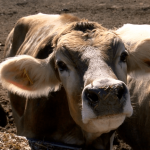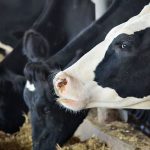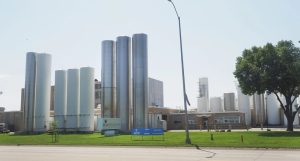
Eyes sparkling over a face mask decorated with little black-and-white cows, Vivienne Kerley-de la Cruz, the energetic new policy coordinator for the Wisconsin Farmers Union, slipped into a booth at Ancora coffee shop near the Capitol.
Brand new in her job, which she started in June, Kerley-de la Cruz has a background in rural organizing and immigrant rights, which makes her well suited to her work in America’s Dairyland, where more than half of dairy farm labor is performed by immigrants, most of them undocumented workers from Mexico.
Kerley-de la Cruz grew up in San Diego, near her father’s family — her paternal grandparents both came from the Midwest, and they still have a farm in Illinois. Her mother was from New York where her parents raised her after moving there from Puerto Rico. In California, Kerley-de la Cruz was accustomed to living in a place where a diverse array of immigrant communities was an accepted part of the landscape.
When she moved to rural Iowa to attend college at Grinnell, she says, she discovered how much rural people and immigrants have in common. “Lacking access to resources has a huge impact on both rural communities and immigrants moving to those communities,” she says. “That got me into rural organizing as a means to advocate for rural folks, who I personally feel policy isn’t written for, often.”
While studying political science and Latin American studies at Grinnell, Kerley-de la Cruz got an internship with the group Immigrant Allies in tiny Marshalltown, Iowa, supporting the growing immigrant community. She got to know rural residents in an area where the local JBS Swift & Co. meatpacking plant employed about 900 Mexican workers, mostly from the village of Villachuato in Mexico.
The immigrant community has helped revitalize Marshalltown, but the meatpacking plant was the target of one of six major ICE raids on Swift & Co. during the George W. Bush administration in 2006. Parents were deported, leaving children waiting at school with no one to pick them up.
“It was brutal. It was horrible, and the wounds of that raid are still felt,” says Kerley-de la Cruz.
That history, and the need for increasing community support for immigrants, led to the formation of the group she worked for, Immigrant Allies. The group also served a large Burmese refugee community in the area.
Immigrants and longtime rural residents shared struggles
Kerley-de la Cruz spearheaded the creation of a community ID program for Immigrant Allies, getting hundreds of IDs to people in the community. The program, in partnership with community members and local police, allowed undocumented immigrants and other people who didn’t have driver’s licenses to get an ID that was accepted locally for things like registering children for school and opening a bank account.
“We encourage everyone, for example folks who don’t have a permanent residence, homeless folks, elderly folks who don’t drive [to get the community ID] — because in rural Iowa getting to a DMV can be really hard and there are so many things which require us to have an acceptable form of identification,” says Kerley de la Cruz.

She also volunteered as a translator at a local legal clinic and created Spanish-language resources for community social service programs, including food banks and women’s shelters. During the pandemic, Immigrant Allies helped to get COVID-19 vaccines out to the community.
“It was a really amazing thing for me to see the way in which rural communities pulled together to support folks in their community and kind of rejected the notion that there were two groups of people … the old Marshalltown and the growing community of immigrants,” says Kerley-de la Cruz.
Among the particular challenges for a lot of people living in rural areas, she points out, are lack of access to health care as rural hospitals, pharmacies and family planning centers close, lack of nearby grocery stores, no public transportation and the near absence of affordable child care. When she was at Grinnell, she says, the waiting list for the only nearby child care center with a sliding scale was seven years long. “All of these issues are intertwined,” she says. “And they’re all really hard for rural folks.”
People have it really hard … I wanted to advocate for them
– Vivienne Kerley-de la Cruz
“I feel like the most vulnerable people, including undocumented folks, in rural spaces with less access to resources have it really hard,” she says. “So I wanted to advocate for them.”
The work she did in Marshalltown, Kerley-de la Cruz says, inspired her because “it was centered around bringing the community together and building bridges.”
Some people in rural communities have talked to her about “the way it used to be,” she says — “which is always a reference to the way it was before immigrants came. But they neglect to realize the ways in which so many local economies in rural communities are failing, because young people can’t afford to move back. But immigrant communities are [gowing]— and that’s revitalizing the local economy.”
The political whirlwind of 2020
During college, Kerley-de la Cruz took some time off to do political organizing during the Iowa caucuses in the lead-up to the 2020 presidential election. She went to Texas for Super Tuesday. When she got back to campus COVID-19 was just hitting and she spent the summer in lockdown. When school started again in the fall, she worked on voter protection in Iowa. She went to Georgia to work the Senate runoff. Shortly after graduation she took the job with the Wisconsin Farmers Union.
“In many ways organizing a political campaign is transactional. You want these people to be your voters,” she says. She has enjoyed returning to community organizing focused on achieving specific, practical change.
In her new job as policy coordinator for the Farmer’s Union, she deals with government relations and “special projects” — special orders of business chosen by members at their annual meeting.
This year’s list of special projects includes dairy policy reform, antitrust issues, climate change, meat processing and pandemic response and recovery.
“One of the reasons that I joined Farmers Union is because there’s a lot of really good policy that understands the intersectionality of rural issues including immigration,” she says Kerley de la Cruz.

“We all know that immigrants are critical to our food system,” she adds. “And for that reason, we support a lot of pro-immigrant legislative pushes.”
WFU supports restoring driver’s licenses for undocumented immigrants, which the Wisconsin Legislature took away in 2007, as well as access to medical care and education for all immigrant children. The group also supports a family supporting wage for everyone, and has called on the federal government to grant temporary visas for undocumented farmworkers and their families, and for a permanent guest worker program with a pathway to citizenship.
“There are a lot of places that I felt that immigration and people of color and other marginalized communities are centered in this policy,” says Kerley-de la Cruz. “And I think it’s really important.”
Lately, Kerley-de la Cruz has been getting up to speed on antitrust issues in agriculture and dairy policy reform. “I had no experience with dairy policy and it’s so complicated and hard to understand,” she says.
On a recent call a Farmer’s Union member compared the complexity of milk pricing to the federal tax code. She agreed.
Record farm losses are ‘heartbreaking’
Other antitrust issues include the “right to repair” — the pushback against contracts that force farmers to rely on tractor dealerships to do all the repairs on equipment, even if they could do them more cheaply on their own. Another major issue is the rapid consolidation of dairy cooperatives. As they’ve grown, milk co-ops are increasingly refusing to bother picking up milk from small farms, when they can get a bigger load with fewer stops by only visiting mega-dairies.
“It’s heartbreaking,” Kerley-de la Cruz says. “Wisconsin is losing a family dairy farm each day. Not only are family farms part of the backbone of rural communities and economies, but family dairy farms have a long legacy in Wisconsin. We’re considered ‘America’s Dairyland,’ for a reason. But, consolidation and vertical integration in every part of the dairy industry is pushing out family farmers. Dairy industry consolidation outpaces that of every other agriculture industry. The slogan for the dairy industry has become, ‘get big or get out,’ in other words, grow your operation tremendously or shut your doors. We have to fight against that.”
The Wisconsin Farmers union is fighting the increasing vertical integration — with a handful of large corporations controlling every aspect of the dairy industry.
“I work for our membership,” says Kerley-de la Cruz. Lately she has been meeting with people after local chapter meetings and on Zoom calls and in August she was at the statewide summer conference in Chippewa Falls. “I feel like hearing from folks at the grassroots is the most important way for me to learn,” she says.
She has also been having meetings with environmental and agriculture groups, and working on projects with the Center for Integrated Agriculture at the University of Wisconsin.
“We’re nonpartisan, and we work with everyone,” she says. “We just focus our efforts on our policy, and whoever is supporting our policy, we are supporting and partnering with.”
That means, when the Wisconsin Legislature comes back in session, she will be meeting with legislators from both sides of the aisle.
And at the National Farmers Union’s annual “fly-in” to Washington, DC — which is virtual this year — she will meet with as many members of the Wisconsin Congressional delegation as possible.
Right after the summer conference, Kerley-de la Cruz got to use her Spanish when she joined WFU members knocking on doors in Arcadia, speaking to community members, including employees of the chicken processing plant and Ashely Furniture there. “It was really interesting to hear their experiences,” she says. This year, WFU will follow up with the people she talked to and continue to develop a plan for each community, to “fight power in the food system,” she says. WFU organizers are still in the information-gathering phase, “Which I really like, because I think you can’t prescribe a solution to a problem people don’t have,” says Kerley-de la Cruz. “And we expect that many of the difficulties in these communities fall in line with what we support through our policy.”
“Going to the community and asking what works and what doesn’t work, we can find out how to help.”
Broadly, WFU organizers plan to address injustice and power in the food system in the coming year, she says. “But what the trajectory of the organizing effort is exactly, is still yet to be determined.”
























